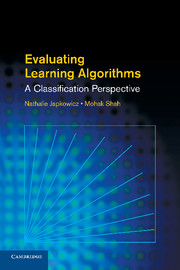Book contents
- Frontmatter
- Contents
- Preface
- Acronyms
- 1 Introduction
- 2 Machine Learning and Statistics Overview
- 3 Performance Measures I
- 4 Performance Measures II
- 5 Error Estimation
- 6 Statistical Significance Testing
- 7 Datasets and Experimental Framework
- 8 Recent Developments
- 9 Conclusion
- Appendix A Statistical Tables
- Appendix B Additional Information on the Data
- Appendix C Two Case Studies
- Bibliography
- Index
Preface
Published online by Cambridge University Press: 05 August 2011
- Frontmatter
- Contents
- Preface
- Acronyms
- 1 Introduction
- 2 Machine Learning and Statistics Overview
- 3 Performance Measures I
- 4 Performance Measures II
- 5 Error Estimation
- 6 Statistical Significance Testing
- 7 Datasets and Experimental Framework
- 8 Recent Developments
- 9 Conclusion
- Appendix A Statistical Tables
- Appendix B Additional Information on the Data
- Appendix C Two Case Studies
- Bibliography
- Index
Summary
This book was started at Monash University (Melbourne, Australia) and Laval University (Quebec City, Canada) with the subsequent writing taking place at the University of Ottawa (Ottawa, Canada) and McGill University (Montreal, Canada). The main idea stemmed from the observation that while machine learning as a field is maturing, the importance of evaluation has not received due appreciation from the developers of learning systems. Although almost all studies make a case for the evaluation of the algorithms they present, we find that many (in fact a majority) demonstrate a limited understanding of the issues involved in proper evaluation, despite the best intention of their authors. We concede that optimal choices cannot always be made due to limiting circumstances, and trade-offs are inevitable. However, the methods adopted in many cases do not reflect attention to the details warranted by a proper evaluation approach (of course there are exceptions and we do not mean to generalize this observation).
Our aim here is not to present the readers with yet another recipe for evaluation that can replace the current default approach. Rather, we try to develop an understanding of and appreciation for the different concerns of importance in the practical application and deployment of learning systems. Once these concerns are well understood, the other pieces of the puzzle fall quickly in place since the researcher is not left shooting in the dark.
- Type
- Chapter
- Information
- Evaluating Learning AlgorithmsA Classification Perspective, pp. xi - xivPublisher: Cambridge University PressPrint publication year: 2011



